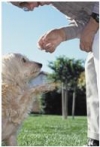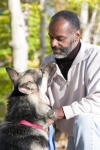Cindy Bruckart

Cindy Bruckart is a dog trainer in the Portland, OR metro area.
She runs Regarding Rover, LLC offering private training and board & train programs.
She is also the Play Group Coordinator and Trainer at Multnomah County Animal Shelter, which is an open-admission, Open Paw, county shelter.
She specializes in puppy and adolescent dog training with a focus on training during off-leash play.
Cindy is a Certified Pet Dog Trainer, an AKC Canine Good Citizen Evaluator, a Certified C.L.A.S.S. Evaluator, blogger, podcast host and public speaker. She is also a proud, professional member of the Association of Pet Dog Trainers.
Cindy is currently traveling the country to speak about shelter play groups in her seminar Beyond Socialization - Using Shelter Play Groups for Training & Assessment.














